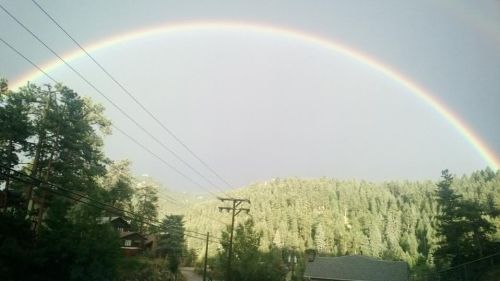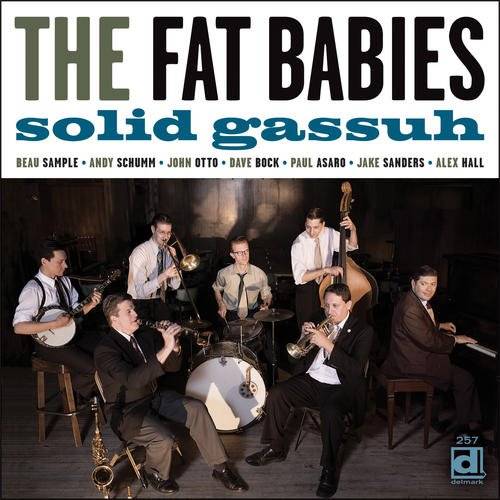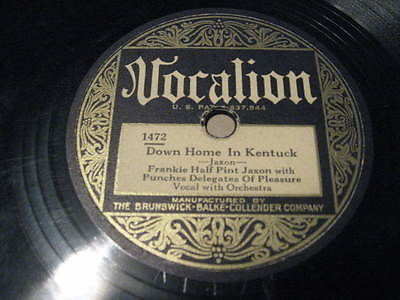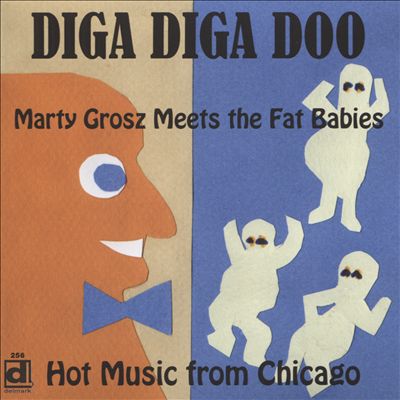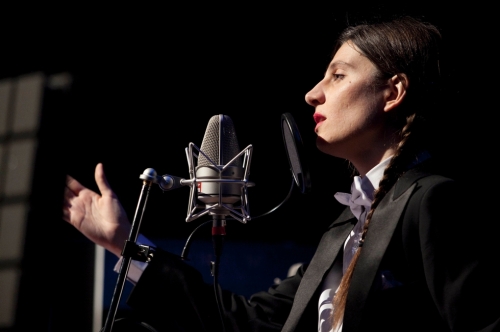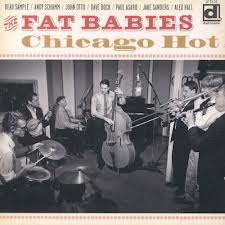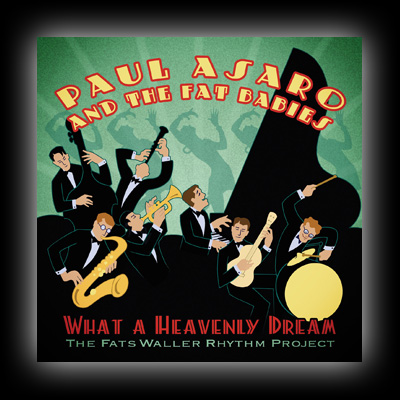The drummer and versatile bandleader — man of many personalities, all of them rocking — Hal Smith is also a fine writer, someone who counted his too-rare opportunities to play alongside the Chicago clarinetist Frank Chace as life-altering experiences. Here, with Hal’s permission, I’ve reprinted his tribute to Frank, first published in JAZZ RAMBLER and reprinted in JAZZ BEAT.
FRANK CHACE — FREE SPIRIT OF THE CLARINET
By Hal Smith
President, America’s Finest City Dixieland Jazz Society
Chicago pianist Oro “Tut” Soper once said, “A Chicago Jazz musician will always have to fight to keep a free, wild heart.” For over 60 years, clarinetist Frank Chace fought for that same freedom.
Chace was born in Chicago on July 22, 1924—over three years before the first classic recordings that would define the Windy City’s musical style. As a youth he played flute, but did not stay with the instrument. In 1943, while attending Yale University, he was drafted by the U.S. Army. The Army is often castigated—justly—for its treatment of musicians such as Lester Young. Luckily for Frank Chace, his Army hitch yielded a benefit: A posting to New York, which resulted in an opportunity to hear Pee Wee Russell at Nick’s. Chace was instantly drawn to Russell’s idiosyncratic sound. He took up clarinet and used Pee Wee Russell’s music as a template for his own playing.
His first recordings were made with the “Cellar Boys” in New York in 1951. The personnel included three musicians who became lifetime friends of Chace: guitarist Marty Grosz, multi-instrumentalist John Dengler and pianist Dick Wellstood. (The great New Orleans bassist Pops Foster and Jelly Roll Morton’s drummer Tommy Benford also played on the records).
Later in 1951, Chace played with Wild Bill Davison at George Wein’s Storyville Club in Boston. Two of the evenings with Davison were recorded and several tracks were issued on the Savoy label.
In 1952, Chace played at the Barrel in St. Louis. The band included another lifelong friend: pianist Don Ewell. Live recordings made at the Barrel indicate that although Pee Wee Russell was still his main inspiration, Chace had also listened to Omer Simeon, Johnny Dodds, Frank Teschemacher and Darnell Howard.
After the St. Louis job ended, Chace established permanent residence in Chicago. In 1955 he played with the Salty Dogs. He also recorded with pianist Dave Remington for the Jubilee label and with Natty Dominique’s New Orleans Hot Six for Windin’ Ball. (Dominique’s group also included the legendary Baby Dodds and Lil Hardin Armstrong). Two years later Chace played a concert in Minneapolis with Doc Evans—later issued on a Soma LP.
One of Frank Chace’s greatest performances was recorded in 1957, when Marty Grosz organized a recording session for the Riverside label. The record, “Hooray For Bix,” by the Honoris Causa Jazz Band, featured Chace on clarinet and bass sax. The other sidemen were: Carl Halen, cornet; Bud Wilson, trombone; Bob Skiver, tenor sax and clarinet; Tut Soper, piano; Chuck Neilson, bass; and Bob Saltmarsh, drums. Bill Priestley, a longtime friend of Bix Beiderbecke, played cornet and guitar on a few tunes. Grosz played guitar, led the band and wrote the arrangements. His charts were based on the sound of Bud Freeman’s Summa Cum Laude band (which was also the inspiration for the band name). Chace is in top form throughout the record, but his first chorus on “Sorry” is the crown jewel of the session. After the four-bar introduction by the horns and string bass, the horns play the melody in tight harmony. Chace floats above the ensemble, joyfully deconstructing the melody in the best tradition of Pee Wee Russell. His use of extended harmonics and rhythmic suspension is as close to “free jazz” as one can get in a swing setting. This breathtaking chorus is Chace’s supreme moment on record and one of the most inspired solos in the history of recorded jazz!
Another highlight for the clarinetist in 1957 was the opportunity to meet Lester Young when both were performing in Indianapolis. One night, after their club date was finished, drummer Buddy Smith offered to take Chace to the hotel where Young was staying. The other musicians gathered around “The Prez,” but Chace hesitated. Young finally asked the shy clarinetist to join the throng, addressing him as “Long-Distance Man.” Compare Lester Young’s introspective clarinet playing on “I Want A Little Girl” (with the Kansas City Six) with Chace’s on “For No Reason At All In C” from the “Hooray For Bix” session. In Lester Young’s own words, “See if you hear something.”
In 1959, Chace was reunited with Don Ewell and John Dengler when Grosz assembled a recording band for the Audio Fidelity label. The band, with Max Kaminsky, Cutty Cutshall, Gene Schroeder (alternating sessions with Ewell) and Don Maclean, recorded enough material for two LPs: “Roaring Twenties at the Gaslight” and “Banjo at the Gaslight Club.” As good as these recordings are, Chace is even better on some private tapes made during the same period. One of these—a session at Bill Priestley’s home in the summer of 1959—features the clarinetist in a trio with Ewell and Grosz. Musicians and jazz fans agree that Chace’s playing on “I Can’t Believe That You’re In Love With Me” ranks with “Sorry” as one of his greatest performances.
He also worked briefly with Gene Mayl’s Dixieland Rhythm Kings in 1959. That particular edition of the band included banjoist and vocalist Clancy Hayes. During that period, Chace and Hayes were involved in another memorable session at Priestley’s, with vocalist Lee Wiley. Fortunately, the tape recorder was running on that occasion too!
Chace’s only commercially-issued recordings from the early 1960s are two LPs on the Jazz Art label, taken from rehearsal sessions with the legendary trumpeter Jabbo Smith; these sides are being reissued with this release. .
During the early and mid ‘60s, except for a brief stint with Muggsy Spanier, Chace worked with the Salty Dogs and also led his own bands. One such group included veterans Johnny Mendel, Floyd O’Brien, Tut Soper and Jim Lanigan as well as younger musicians—Bob Skiver, Grosz and Wayne Jones. When this group played for the Chicago Historical Society in 1964, they were joined by a very special guest—Gene Krupa!
A late-60s Chicago recording session by guitarist/vocalist Jim Kweskin resulted in three more classic Chace solos. The album, “Jump For Joy,” released in 1967, paired Kweskin with cornetist Ted Butterman’s Neo-Passé Jazz Band. In addition to Butterman, the personnel consisted of Chace (clarinet and bass sax); Kim Cusack, clarinet; Johnny Frigo, violin; Grosz (guitar, banjo and arranger); Truck Parham, bass; and Wayne Jones, drums. Fellow reedman Kim Cusack called Chace’s playing on “You’re Not The Only Oyster In The Stew” “one of the sublime moments in jazz.” The clarinet choruses on “Memphis Blues” and “There’ll Be Some Changes Made” are two more outstanding examples of Frank Chace at his best.
Recently, the GHB label released a two-CD set of Chace playing with a specially-assembled band in 1967 at the Emporium of Jazz in Mendota, Minnesota. The group included Bill Price (cornet), Jimmy Archey (trombone), Don Ewell (piano), Bill Evans (bass) and Sammy Penn (drums). A cursory glance at the personnel and their stylistic differences might cause concern. However, the musicians—particularly Chace and Ewell—sound wonderful together.
Sometime during the ‘60s, or possibly the ‘70s, Chace went to work as a technical writer. He continued to work with bands around Chicago, and to play sessions, but did not rely on music for a living. As musician/author Richard Hadlock explains,
“Most jazz players learn to adjust, at least somewhat, to shallow audiences, wrongheaded entrepreneurs, pandering bandleaders and jaded or inept sidemen.
“Not clarinetist Frank Chace, however. Over the thirty-some years I’ve been observing his largely hidden talent, I have heard story after story to do with Frank’s losing out because he wouldn’t play ‘pretty’ or ‘straight’ or ‘traditional’ or some other term that meant going outside his own natural way of making music…
“There have been occasions when Frank simply would not take a paying but dumb job. At other times he hasn’t been hired or was let go because someone wanted to hear, say, Stardust and didn’t recognize Frank’s version of it. The result is that Frank Chace has kept one of the lowest profiles among outstanding jazz players.”
During the 1970s, Chace also listened closely to the music of John Coltrane and other modern jazzmen. In the right setting, his solos often went farther “out” than ever before! Delmark Records producer Bob Koester, a longtime admirer of Chace’s music, wrote about his plan to record the clarinetist with a “modern rhythm section.” Alas, the session never materialized.
This writer’s first encounter with Frank Chace was on Apr. 28, 1985. Pianist Butch Thompson assembled a band to play a concert for the Good Time Jazz Club in Libertyville, Illinois. Butch invited Frank to play clarinet, in a group that included Charlie Devore, cornet; John Otto, alto sax; Jack Meilahn, guitar; Bill Evans, bass; and myself on drums. It was an unbelievable thrill to hear that intense, wailing, clarinet coming from directly in front of the drums! The concert flew by—much too fast—and my only contact with Frank Chace for the next year would be written correspondence. The letters are priceless, especially for the humor. In one exchange, he obviously remembered the salutation on my first letter (“Dear Mr. Chace”). At the end of a very funny letter, which ran to several pages, he signed off as Your Friend, Mr. Chace.
In 1986, he was flown to New York, to perform at the JVC Jazz Festival’s “Chicago Jazz Summit.” An LP was subsequently issued, featuring several instrumental combinations recorded live at the festival. Unbelievably, Chace is only heard on one track. However, it is a rip-roaring version of “At The Jazz Band Ball,” played by Yank Lawson, George Masso, Eddie Miller, Truck Parham, Ikey Robinson, Barrett Deems and festival producer George Wein. Though we can wish that Chace was heard on more tracks, it is safe to say that his two idiosyncratic choruses are easily worth the price of the record!
My final gig with “Mr. Chace” was in 1987—another concert for the Good Time Jazz Club. On that occasion, I led the “Chicago Loopers” which also included Tom Pletcher, cornet; Tom Bartlett, trombone; Joe Johnson, piano; and Dan Shapera, bass. Frank’s playing that day—passionate, rasping, keening, whispered—was other-worldly. It was an indescribable high.
He continued to play with unlimited creativity for nearly 20 more years. In 2001, Drummer Wayne Jones played with Chace at a gig sponsored by Delmark’s Bob Koester. He reported that “Frank sounded not the least dimmed by the passing years.”
Frank Chace died on 28 Dec., 2007. He never gave up that fight to keep a wild, free heart.
Following is a list of recent CD issues that feature Frank Chace:
Salty Dogs 1955 (Windin’ Ball CD-105)
Marty Grosz & The Honoris Causa Jazz Band: Hooray For Bix
(Good Time Jazz 10065-2)
Marty Grosz & The Cellar Boys 1951/Honoris Causa Jazz Band alternate takes 1957
(J&M CD-004)
Jim Kweskin with Ted Butterman & the Neo-Passé Jazz Band: Jump For Joy
(Universe UV0051)
Jimmy Archey & Don Ewell at the Emporium Of Jazz 1967
(GHB BCD-461/462)
Chicago Jazz Summit
(Atlantic 81844-2)
These sessions are due for release in 2009:
Jabbo Smith – 1961 GHB BCD-510
The Chicago Loopers with Frank Chace – Live, 1987 Jazzology JCD 371-372
Butch Thompson and his Boys in Chicago – 1985 Jazzology JCD 373-374
COPYRIGHT, MICHAEL STEINMAN, HAL SMITH, AND JAZZ LIVES, 2010
Unauthorized use and/or duplication of this material without express and written permission from this blog’s author and/or owner is strictly prohibited. Excerpts and links may be used, provided that full and clear credit is given to Michael Steinman and Jazz Lives with appropriate and specific direction to the original content.

